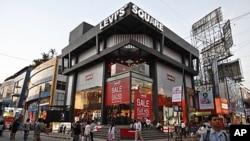The Indian government has formally agreed to allow foreign companies to own 100 percent of stores that sell a single brand. The move could boost investor confidence which sagged after the government backtracked from an earlier decision to allow superstores such as Wal-Mart to enter the country.
In recent years, foreign companies selling single brands such as Nike, Calvin Klein, and Marks and Spencers opened stores in India with local partners because they were restricted to 51 percent ownership.
Now new rules allowing 100 percent foreign investment in single-brand retail will clear the way for such companies to establish fully-owned stores.
Several companies such as Swedish furniture retailer, IKEA, have been wanting to ramp up their presence in India, but said they would only do so when they are allowed full ownership of their retail operations.
However, Ragahv Gupta at consultancy Booz and Company, says many single brand retailers will continue to tie-up with domestic companies. “The local partner does bring in the ability of knowing the local market, knowing how to navigate the system, being able to procure real estate etc,” he stated.
Foreign single-brand retailers are also concerned by a new requirement to get 30 percent of their merchandise from small Indian businesses and artisans. This could be a deterrent for luxury brands entering the Indian market.
Tikka Shatrujit Singh heads Louis Vuitton in India. “We are in a very specific business, it is not easy to source things in our sector or business just like that…we source from the best, whether it is Italy or France or whatever,” Singh stated.
Despite the concerns, the latest move has encouraged foreign investors, who were disappointed when the government backtracked last month on its decision to allow multi brand retailers such as Wal-Mart and Tesco to enter India.
The US-India Business Council says the new rules will encourage more retailers to enter the Indian market. So far they have invested a modest $450 million in the country.
Overseas investment in the retail sector is expected to grow sharply only when foreign superstores are given the green light. Although they can open wholesale stores that supply small businesses, they cannot sell directly to Indian consumers.
Raghav Gupta points out that many retailers will only consider investing in India when they are allowed to sell to consumers. “The big regulatory change will be on the multi brand side….if you look at the retailers who have come into India so far, it is very few and its only the largest companies. And companies like Casino in France or Aldi and Lidl in Germany are very big retailers in their own right, and that may create an opportunity for these to start looking at India,” Gupta said.
The government has begun a fresh round of consultations to see how it can go ahead with the long awaited reform. It reversed a decision to allow global superstores following a political outcry over fears that big foreign retailers will muscle small local shop owners out of business.






